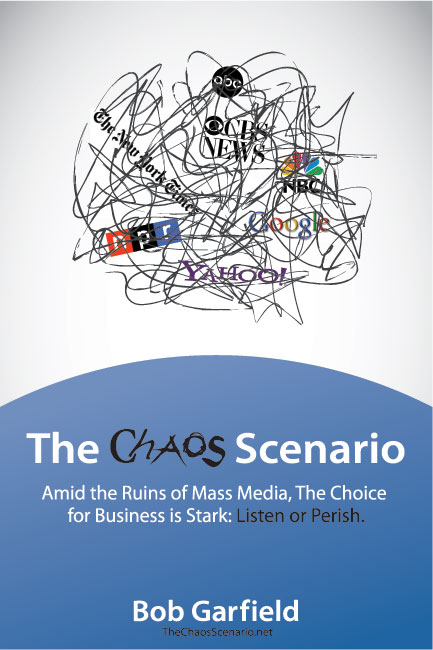by Paul Gillin
 I start lots of books about new media, but I finish very few of them. My ADD is only part of the reason. I often find that authors don't have much to say beyond a few points that are stated clearly in the first 100 pages or so and repeated for the remaining 200.
I start lots of books about new media, but I finish very few of them. My ADD is only part of the reason. I often find that authors don't have much to say beyond a few points that are stated clearly in the first 100 pages or so and repeated for the remaining 200.
Not so with The Chaos Scenario, the new volume by veteran advertising critic Bob Garfield. I devoured this book and was sorry to see it end. One reason: It is so much fun to read.
Garfield is a gifted writer and he's funny as hell. Of the video for OK Go's YouTube hit "Here It Goes Again," he writes, "Everyone on earth has seen the video at least four times, except for certain remote areas in the mountains of Papua New Guinea, where several tribesmen had seen only twice." Or "If it were Japanese steel Google was flooding the market with, instead of kitten videos, it would be called dumping."
Such asides are garnish on a viciously insightful treatise on the death of advertising by someone who has the street cred to make that judgment. Garfield's quarter century of experience qualifies him to say when media is badly broken, which he clearly believes it is.
In an opening chapter entitled "The Death of Everything," he documents the implosion of mainstream media channels of every kind under the weight of new-media competition and changing audience behavior. If your CEO still insists on throwing away money on TV ads, put this chapter in front of him.
Listenomics
Much of the book outlines the principles of "Listenomics," or the premise that institutions that fail to listen to and engage with their newly empowered customers will die. The power that now exists in the hands of ordinary citizens can humble even the most arrogant corporate giants.
Among the examples of this Garfield cites is a grassroots campaign called "Comcast Must Die" which he and a core of frustrated cable subscribers mounted in 2007. Through blogs and message boards, an angry mob of customers turned the tables on a giant utility, forcing meaningful change across its vast customer service operation. As besieged Senior VP Rick Germano ultimately admits, "I'm crying 'uncle' now.'"
Garfield believes in the power of the crowd but not necessarily in its wisdom. Chapter 9 ("Off, Off, Off Madison") presents a scathing indictment of consumer-generated advertising (CGA), which Garfield characterizes as mostly a dull imitation of what non-professionals believe advertising should be.
"Most CGA has been the stuff of tiny little talents with tiny little budgets pursuing tiny little ideas," he writes. Which is not to say that pitting crowds against each other is always a bad thing, as long as the crowds know what they're doing. Garfield praises CrowdSPRING, a competitive foundry for design professionals that created dozens of choices for the book's logo for just $500.
http://gillin.com/blog/2009/09/a-new-media-book-thats-actually-fun-to-read/








No comments:
Post a Comment